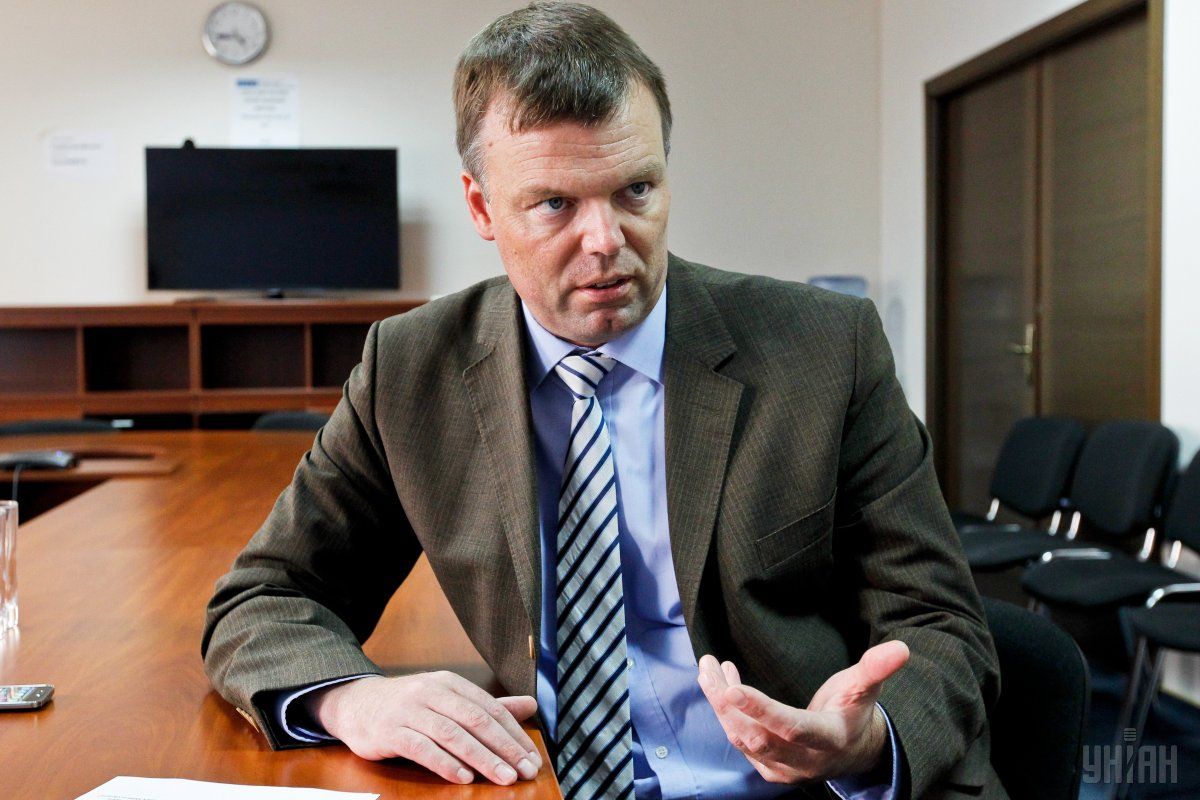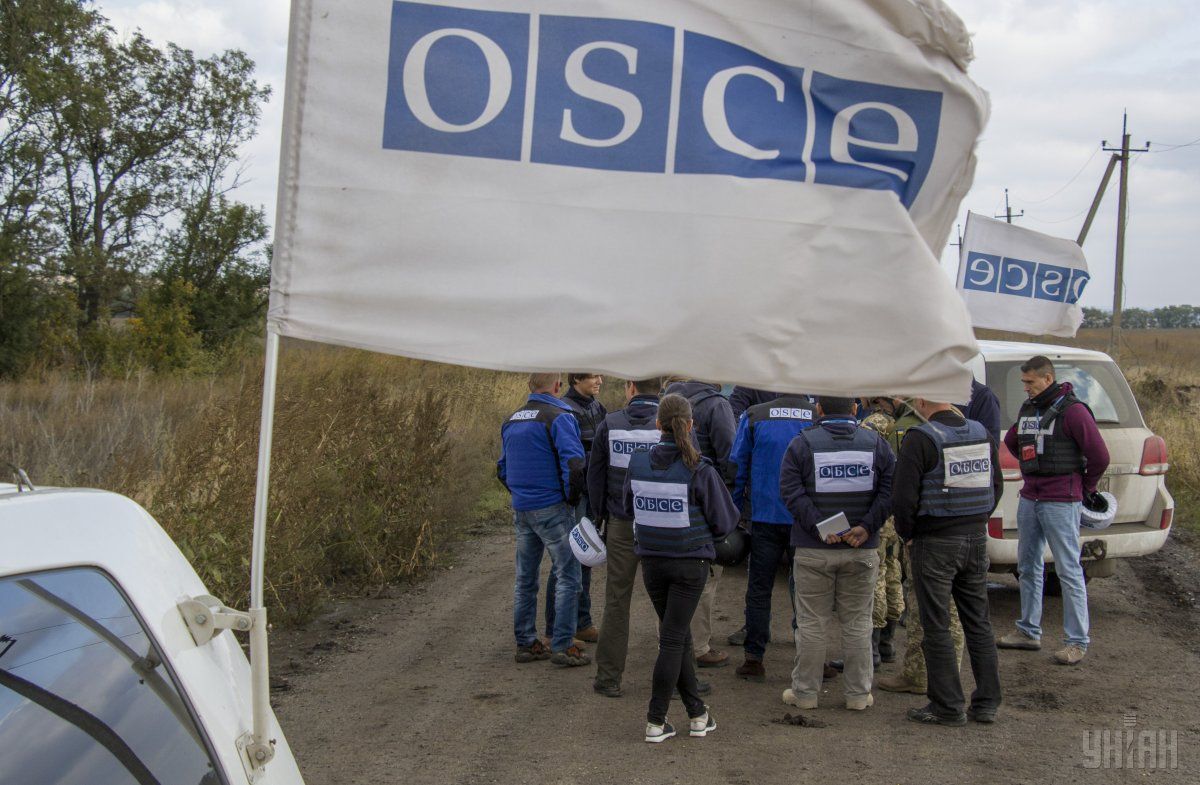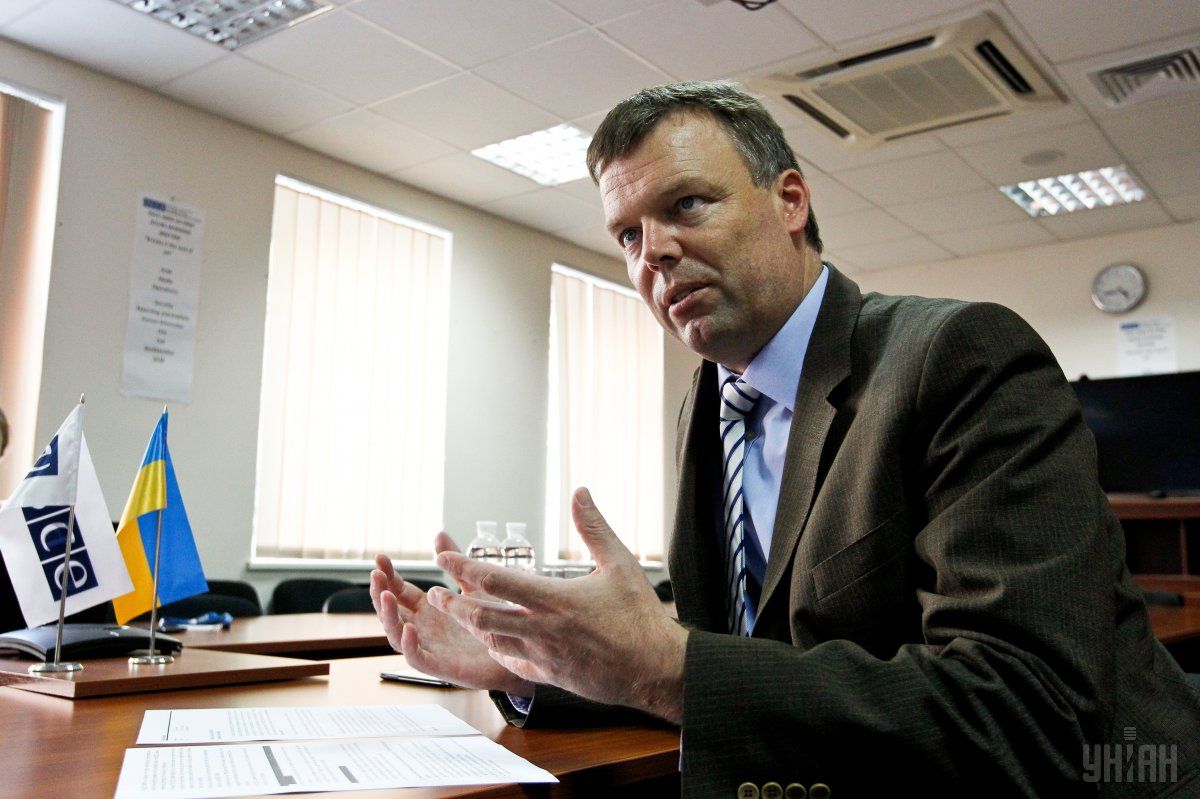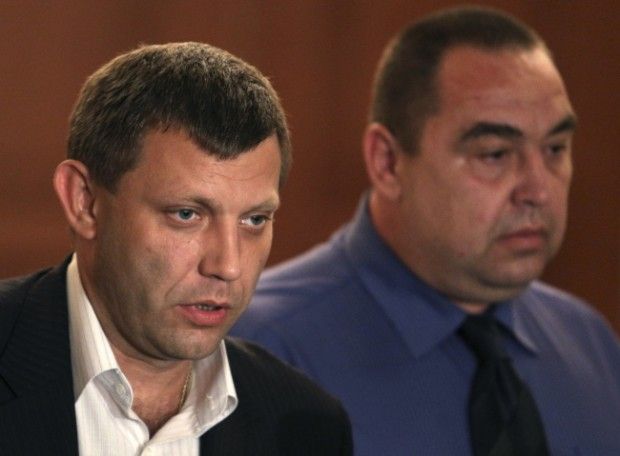
OSCE SMM’s Alexander Hug: The reality of our work is much more complex than just describing it as blindness
Principal Deputy Chief Monitor of the OSCE Special Monitoring Mission to Ukraine Alexander Hug sat down with UNIAN to explain, why he met with militant leaders Zakharchenko and Plotnitsky in Luhansk, who and why hinders the monitors’ work at the contact line, and about the lack of response to the SMM reports.
Lately, we’ve heard opinions on the need to enhance the OSCE SMM mandate, including a possible change of the format to an armed police mission. Now we are not talking about the mechanism of this idea’s implementation but another question arises: Do you see the need to change today’s OSCE SMM for an armed police mission?
The SMM OSCE is an unarmed civilian observer mission. OSCE participating States have repeatedly agreed in consensus to extend the SMM’s mandate [OSCE SMM mandate expires March 31] and as we speak in Vienna at the Permanent Council debates are ongoing on the extension of our mandate. Should participating States agree to change the mandate, for they need to agree in a consensus as well, then of course I will be in a position to give you an assessment. At the moment no such decision has been made.
In order to give you an assessment, first, I need to know what the proposal is, because there are different proposals of what this police mission should be doing and what it should not be doing. At this moment, speaking about suggestions that have not reached a decision stage at the Permanent Council amounts to no more than speculation.
You have repeatedly said that it is necessary to withdraw heavy weapons. What are both sides lacking, in your opinion? Is it political will?
You are right. Political will is needed to make a change. And, we call upon the sides to generate such political will, to conclude agreements and to generate good will and political will to implement them.
What is important at the same time is that we have seen that the sides are capable of withdrawing weapons when this political will exists. So it is not that they are not able to do so; they just don’t have the political will. But we know they can do it; they can stop firing; they can withdraw weapons. The Mission would be there to support the process– we will be there immediately, documenting it.
Only dialogue can bring an end to this conflict. I want to be very clear – you might think that I’m naïve to suggest that but without dialogue, without creating and building on trust; this conflict will be very difficult to resolve. It is now almost three years, and a lot of force has been used. It is clearly time for dialogue to prevail and the conflict to be resolved at the table.
Can the current situation in eastern Ukraine be attributed to as “frozen conflict”?
I have never suggested that what we see in the eastern part of Ukraine is frozen. It is very active. We still see ceasefire violations…
I can just conclude, based on our own observations, and we don’t see everything, but what we do see, suggests that conflict still continues, that the ceasefire is still not adhered to, that weapons which should be withdrawn have not have been withdrawn and the sides still continue to move closer to one another. It is important to underline that the sides have not implemented what they have agreed to a long time ago.

In you last year’s interview with UNIAN, you said that OSCE SMM monitors don’t always have a possibility for a free movement. What is the most common reason the monitors’ access to certain locations is hindered?
There can only be one reason why we are prevented in our activities: those who prevent us do not want us to see something in the area where we want to go to. It is not true to say – as they do – “if you go there it will be too risky” – because it is the responsibility of those in control to control the risk, and even remove the risk.
The SMM is ready to patrol anywhere anytime. It is the sides that refuse to grant the SMM access. By doing so, they prevent the people in Ukraine, all 57 OSCE participating States and the international community, to have access to objective and factual information.
What are they telling you?
Both sides interfere with our freedom of movement. The incidents in areas not controlled by the Government are in particular violent, intimidating and aggressive. We have incidents where, for instance, we are stopped at a checkpoint and soldiers or armed men tell us that you can’t go further because there is active fighting but at the same time hundreds of civilian cars pass through the check point. Armed men threaten us at gun point or with detention. Our monitors have been fired upon.
But I don’t want to speculate about the reasons they might have in their minds. I know and monitors know and the public knows – our task is to monitor and report on our findings. The only reason why they do not allow us to go is so that we can’t monitor, because they know we are a monitoring mission and we are mandated and will report on what we see.
We are delivering very uncomfortable truths for the sides; what we see is not comfortable to hear or read because it shows where there has been noncompliance with the agreements and therefore in order to avoid this uncomfortable truth our patrols are either delayed or denied access or can only access certain areas on a conditional basis.
In the past, you were talking about the necessity to increase a number of SMM bases. What happened to these plans? Are they still on the agenda?
We are willing to continue to increase our presences both at the contact line and near the international [Ukrainian-Russian] border currently not controlled by the Government. What we need for this to happen is the support and security guarantees of those in effective control to allow us to open these bases. Once it happens, we are ready to immediately expand our footprint.

How many bases do you want?
The Chief Monitors decides on the deployment of the SMM monitors. It depends on the situation on the ground and on the situation at the line of contact. It is very difficult to put a concrete number to it as the situation on the ground changes constantly. In the past days a presence near the Donetsk water filtration station, for instance, would make sense. This might change in a week’s time. I don’t want to specify any concrete figures. We have to be ready and we are ready to increase our footprint where this is needed within the constraints of the field operation of the OSCE.
OSCE SMM critics often claim that the mission goes blind when the shooting starts. In other words, when everything is calm at the contact line, the SMM is out there. But when the shooting starts, the monitors are not at the scene. Can you, please, explain why is it so? How can you comment on this?
First of all a quick look at our daily reports suggests that we witness the firing directly, meaning that we are there when it’s happening and the incident last Friday is another deeply regrettable and deplorable case when our monitors actually came under fire [on March 10, OSCE SMM monitors were targeted in Donbas territory beyond Ukraine control, near one of the militant-controlled villages]. They not only heard it [a ceasefire violation], they actually came under fire in broad day light. That is point number one.
Point number two. We monitor not only by physical patrolling but also through remote observation in the night from 14 different locations along the contact line. In addition to that, through UAVs, satellites and cameras. We are there. And you can see that in fact on many occasions most of the ceasefire violations that we record are at night. We register them at night; not during the day.
At the same time, when we want to approach certain areas at the contact line where fighting takes place, we are prevented from going there by those who engage in the fighting – they restrict us in our work. Of course, then we don’t see what is happening but not because we don’t want or because we are blind. It is because the sides do not allow us to access certain areas. And what we see is indeed probably just the tip of the iceberg.
But still we witnessed over 300,000 ceasefire violations last year. And the question which should be asked even if we don’t see everything is: what are the sides doing in response to what we have already seen. If we see hardware that should not be there in a government-controlled area or in a non-government-controlled area, the question should not be what did the SMM not see; the question should be what is the government doing and what are those in effective control in certain areas of Donetsk and Luhansk regions doing to remove those violations that we have actually seen. If all the violations that we see were dealt with by the Government or those in effective control, the situation would be vastly better. As already mentioned, our reports contain uncomfortable truths. Not only do the sides refuse to accept these truths, they fail in the majority of cases to act upon these truths.
To put it simple, you disagree with an opinion that the OSCE SMM is blind...
Well, it does not reflect the reality. Because the reality of our work is much more complex than just describing it as blindness.

Recently you had a meeting with Mr Zakharchenko and Mr Plotnitsky. What else did you discuss except ceasefire? Are you planning to hold other meetings?
Yes, I can confirm that I was in Luhansk. It is important to engage, and we have never shied away from invitations for discussions; any discussion that is constructive and leads to results is welcomed. However, the very public nature of this meeting or this discussion was not necessarily conducive to the delivery of concrete results. But we will in any case continue our dialogue and our colleagues in Donetsk and Luhansk meet with the so-called “LPR” and “DPR” on a regular basis.
At the same time, of course, we maintain strong relationships with various Ukrainian authorities at all levels. We are keeping these channels open; dialogue is the only way to solve this conflict. We will continue to offer our good offices to facilitate dialogue, with anyone who is willing to accept our invitation. We expect that if people accept out invitation that they participate in good faith, and that they come to those meetings with political will to generate agreements, and political will to implement these agreements. This is our call upon them and we will continue to make this call to the sides.
We’ve already had so many talks, so many dialogues, but words and deeds are separated. In your opinion, how one can make words correspond with deeds?
It is a very important question. First of all, our role is to monitor and report and to facilitate dialogue. That is our role. To stop fighting, to withdraw weapons, to demine, to allow people to get their normal life – these are the tasks of those who control these matters. It is their responsibility; we will document whether they do it or not. Unless there is political will to implement what they have agreed, it will not happen.
At this moment, the Minsk agreements are the only platform where these discussions can take place. And we, as a mission, will not give up facilitating dialogue with everyone who wants it and is willing to join in dialogue; we expect everyone who participates in dialogue to do so in good faith. This is very important – in good faith, everyone who comes generates political will to create agreements and generates political will to implement them. Unless this happens it will be indeed difficult to see when this will end. It is for Ukrainian civilians from both sides of the contact line that this should end.
Our information suggests that the humanitarian agenda should be given priority. We document very clearly the suffering of the civilian population. From the first of January to the 28th of February we documented 76 civilian casualties, of which 16 were fatalities. It is for those 76 people and all the other hundreds of thousands of Ukrainians that still live in these areas that this conflict should come to an end. This is convincing to me and I hope it is convincing to those who make the decisions to stop firing, to withdraw weapons and to stop engaging with one another with weapons rather than at the table.
Which side do we have to blame?
The signatories of the Minsk agreement all have taken responsibilities to deal with the situation in eastern Ukraine. On the ground, we have clearly established consequences of non-adherence to those agreements. It is not up to the mission to make speculative conclusions on which side is to blame.
What I would like to ask everyone is: what are the signatories doing to stop this madness. That is the question that needs to be asked.
By apportioning blame you will not find a solution; you will only find a solution if measures are taken to stabilise the situation. My question is: what has been done by the signatories to remove the weapons that are in the security zone, those that should not be there. Look at our reports – they are full of these weapons. Every day we see them despite the sides saying “we have withdrawn them already”. Second – we hear these weapons being used. They are not just there, they are also being used. We hear them every day. What are the sides doing to remove those weapons and stop firing? What are the sides doing to stop coming close to one another, resulting in unavoidable tension? What are the sides doing to stop mining areas where civilians get injured, killed and maimed? What are they doing?
Probably, you never will be able to answer the question as to who started it because a conflict is not a clinical operation; it is messy, and it is multi-layered. It is not just one shot from one side and one from another; it is not Ping-Pong. Therefore it is important to ask what steps have been taken in the direction of what has already been agreed, towards bringing more stabilisation to the situation.
Iryna Somer

